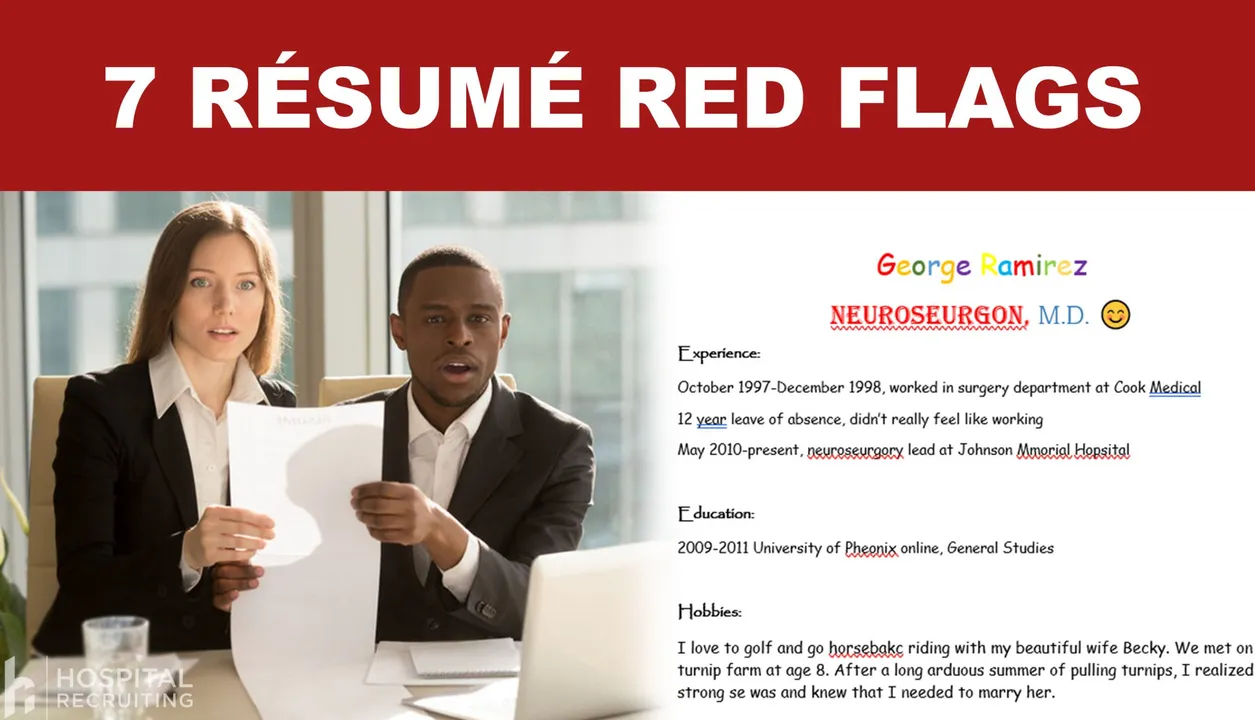Résumé Red Flags: Post-Pandemic

As the talent market tightens, many institutions are loosening their requirements to hire. Three to five years’ exact experience has shifted to one to three years’ relevant experience. This might be a good thing – opening up facilities to a larger applicant pool that is just as qualified and capable. While casting a wider net is important, make sure you’re not overlooking obvious or subtle red flags on the application or résumé.
Even in the post-COVID recruitment market, when talent is tough to find, there are still red flags that should make hiring authorities pause. You may be desperate to meet head count, but your facility shouldn’t sacrifice quality hires for quantity. Here are some things to look out for, whatever market conditions come your way.
It’s just a mess
A messy résumé or application is the first sign of a messy employee. Whether it’s spelling or grammar mistakes, job history that’s unorganized or an overall look of chaos, a résumé is the first chance an applicant gets to make an impression. If the impression presented is a disaster, it’s not hard to imagine the work will be the same. Consider job seekers have all the time in the world to create their résumé: if they can’t get the details right with no time pressure, how will they get the details of their work right?
Rules don’t apply
Failure to comply with basic instructions may indicate candidates that don’t think the rules apply to them. You’ve asked for copies of certifications or licensure; salary requirements or history; references; or included specific instructions on how to apply. They’ve sent in their résumé or application without. They may be qualified for the role, but are they a good match for the institution? If job seekers can’t follow basic rules when trying to make a good first impression, they probably won’t worry much about rules down the road.
Applying for anything
If the résumé could have been sent for more than one position, you may either be getting automatic applications – generated by a career site, or the applicant hasn’t bothered to customize his/her submission for your position. You may not request a cover letter, but it can be helpful in assuring the candidate is interested in the specific opening you’ve posted, rather than sending out résumés to any institution in the area.
Unexplained time off
In a post-pandemic environment, it may be easier to overlook gaps in employment that cover the span of the outbreak. The candidates may have had childcare issues or had the virus themselves. That doesn’t mean gaps in employment that pre-date the outbreak should be overlooked. For some job seekers, lengthy time off work meant raising children; for others it meant difficulty holding down a job. While you might not want to disqualify a candidate with gaps in employment, be sure to find out exactly what caused them before making an offer.
Too good (or bad) to be true
A meteoric rise in employment is just as big a red flag as a meteoric fall. From entry-level to management in less than six months warrants scrutiny. From management to entry level warrants worry. If career progression looks too good to be true, like most things, it probably is. If it looks like a road map for career disaster, you might want to move on to the next candidate.
Let me be unclear
There’s a reason that résumé is so vague. It’s tough to decide if the application is for a nursing position or a job in the kitchen. Applicants may be cutting and pasting from your posting or just putting in as much generic information as possible to get a job – any job – within your facility. Being open to any available position may be appropriate for entry-level workers, but as you go up the career ladder, it’s not acceptable. You may not require a customized résumé and cover letter for each opening, but there should be at least some applicability.
All about me
Too much detailed information that isn’t job-specific is another area for concern. When applications give more personal details than professional, it’s fair to assume career is not their priority. Hobbies, interests and personal photographs are not appropriate content for an application. They may look like an interesting person to have lunch with, but not necessarily your next stellar hire.
In the post-pandemic market, healthcare providers may be challenged to find talent. Many furloughed employees are ready to return to work, but their facility isn’t presenting an opportunity to attract top talent. Make sure your need to fill vacancies isn’t rushed. A bad applicant will make a bad employee and the need to rehire. Watch for red flags and get the right candidate for every position.
Related Posts
